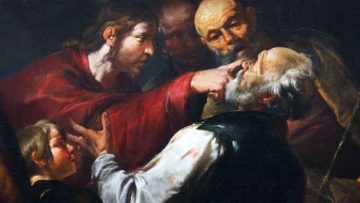For the Thirtieth Sunday of Ordinary Time Fr. Paul Gallagher, OFM offers a Scriptural Reflection on Jesus as servant. This content is edited by Franciscan Sister of Christian Charity Sister Anne Marie Lom and Joe Thiel. The excerpts from the Sunday readings are prepared by Joe Thiel. To read or download the complete pdf with excerpts for your prayer, please click here: Franciscan Gospel Reflection October 24 2021 Excerpts are from the Lectionary for Mass for Use in the Dioceses of the United States of America, second typical edition © 2001, 1998, 1997, 1986, 1970 Confraternity of Christian Doctrine, Inc., Washington, DC. Used with permission. All rights reserved. No portion of this text may be reproduced by any means without permission in writing from the copyright owner. Photo: 8026dedfc7454d6f852e823acdd57d0c.jpg (1280×720) (pinimg.com)
Mark 10:46-52
As Jesus was leaving Jericho with his disciples and a sizable crowd, Bartimaeus, a blind man, the son of Timaeus, sat by the roadside begging. On hearing that it was Jesus of Nazareth, he began to cry out and say, “Jesus, son of David, have pity on me.” And many rebuked him, telling him to be silent. But he kept calling out all the more, “Son of David, have pity on me.” Jesus stopped and said, “Call him.” So they called the blind man, saying to him, “Take courage; get up, he is calling you.” He threw aside his cloak, sprang up, and came to Jesus. Jesus said to him in reply, “What do you want me to do for you?” The blind man replied to him, “Master, I want to see.” Jesus told him, “Go your way; your faith has saved you.” Immediately he received his sight and followed him on the way.
Background:
In last week’s gospel, Mark described Jesus’ response to James and John, who asked for the seats of honor and power when Jesus comes into his glory. In his response, Jesus told them that Gentile rulers lord over those under them, thus making their importance felt. In contrast, Jesus has come to be a servant, not to be served, and to give his life in ransom for the many. This week’s gospel text follows immediately after that text in Mark. Here Jesus is portrayed as living out what he has just instructed the disciples: Jesus is the servant who responds to the call of blind Bartimaeus.
Bartimaeus is very clever in how he has made his request. No doubt he has heard of Jesus’ reputation for healing, and therefore he shouts out repeatedly, “Son of David, have pity on me.” The phrase does two things. By calling Jesus the “Son of David,” he is acknowledging him as the Messiah, and linking him with Solomon, the son of David. Solomon was known as a wise and competent ruler. Second, by asking for mercy, he is implying that he be given something that is owed to him, asking for a debt to be paid. The debt that needs to be repaid is the repeated public praise that the blind man has already offered by calling out after Jesus with the title “Son of David.” If Jesus accepts the praise, he is responding to the debt he owes Bartimaeus. Assuming that the large crowd is blocking Bartimaeus from Jesus’ view, Jesus calls him. The crowd who are usually voiceless in the gospels move from trying to silence Bartimaeus to encouraging him to approach Jesus. Jesus asks what he would have him do for him. Bartimaeus tells Jesus that he wants to see. Jesus tells him that his faith has saved him and to go on his way. Now Bartimaeus is in debt both to God who restored his sight and to Jesus who acted as the servant of God. In recognition of his debt, Bartimaeus now joins Jesus as he makes his way to Jerusalem.
If we step back into Mark’s gospel, there is another beautiful facet of this gospel to discover. Recall the gospel from two weeks ago, the story known as the Rich Young Man. The man came to Jesus asking what he had to do to inherit eternal life. Although he had kept the commandments since his youth, he was unable to accept Jesus’ invitation to come and follow him because he had many possessions. The gospel says that he went away sad (Mark 10:17-30). However, Bartimaeus, when he learns that Jesus is calling him, throws off his cloak, springs up, and comes to Jesus, never to look back. Beggars usually spread their cloak before them to collect coins that were tossed in their direction. Imagine Bartimaeus being blind and hearing Jesus calling him, jumping up to respond to Jesus’ invitation and the coins he had collected flying in different directions. The contrast between the response of the two men to Jesus’ invitation is a delightful part of the text that might be overlooked.
Even earlier in his gospel Mark recorded another story of Jesus encountering a blind man (Mark 8:22-26). This central section of Mark’s gospel is framed by two stories of Jesus’ encounters with blind men. In this section of the gospel, Jesus has been revealing who he was and the events that awaited him in Jerusalem. But the disciples have been reluctant to comprehend Jesus’ teaching and have needed to be instructed repeatedly on the role of Jesus’ disciples. In these final verses before Jesus enters Jerusalem, Mark presents us with Jesus who is the servant even of the blind and the outcasts. Bartimaeus is a model of faithful disciples who leave everything to follow Jesus to Jerusalem.
Reflection Questions:
- What is your experience of people with physical disabilities?
- How do you understand the crowd’s interaction with Bartimaeus?
- Have you ever felt like what you wanted to say to God wasn’t important enough?
- Have there been people in your life who told you, “Take courage, get up, he is calling you?”
- Place yourself in the scene of today’s gospel. Maybe you are Bartimaeus’s cousin and have just helped him set up for the day as the events unfold. How do you feel about Bartimaeus and having to help him set up each day? What are you thinking when the crowd starts coming?
- And when Bartimaeus starts calling out over and over, louder and louder?
- And when the crowd tells him to be quiet?
- And when Jesus hears him calling?
- And when Jesus tells them to call Bartimaeus over?
- What are you thinking when you hear the crowd now tell him to come to Jesus, that he has nothing to fear?
- And when you see Bartimaeus, blind but still going as fast as he can to Jesus?
- Can you hear Jesus ask him what it is he wants him to do for him?
- What happens inside you as you hear Bartimaeus say, “Master, I want to see.”
- What happens within you the moment you realize that Bartimaeus can see?
- And if Jesus were then to turn to you and ask, “N_____, what would like me to do for you,” what would you say?
- Can you talk with God about the honesty of Bartimaeus, or about whatever this gospel text is saying to you now?



